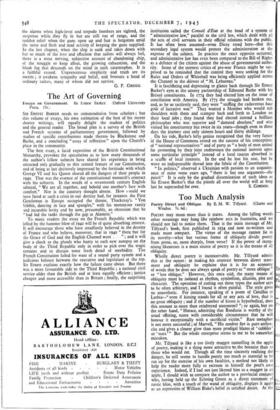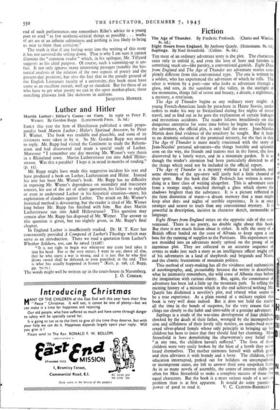Too Much Analysis
POETRY may mean more than it states. Among the falling words other meanings may hang like rainbow arcs in fountains, and we should not fail to notice them. That is the main message of Mr. Tillyard's book, first published in 1934 and now re-written and made more compact. The virtue of the message cannot lie in its novelty—what but various forms of obliquity divide poetry from prose, or, more sharply, from verse? If the power of recog- nising likenesses is a main source of poetry so it is the means of all obliquity.
Wholly direct poetry is inconceivable. Mr. Tillyard admits this at the outset: in making his contrast between direct state- ment and obliquity he explains that it is for an economy of words that he does not always speak of poetry as "more oblique" a or "less oblique." - However, this once said, the many means of obliquity must be isolated as rhythm, symbolism, allusion, plot and character. The operation of cutting out these types the author says to be often arbitrary, and I found it often painful. The style gives no anaesthetic. For instance, speaking of a poem of Catullus to Lesbia—" even if kissing stands for all or any acts of love, that is no great obliquity ; and if the number of kisses is hyperbolical, does this amount to more than reinforced statement? "; or again, but on the other hand, "Horace, admitting that Bandusia is worthy of the usual offering, states with considerable circumstance that he will honour it exceptionally with a sacrificial victim." Rare metaphor is not more successful ; of Marvell, "His modest fire is pure anthra- cite and gives a clearer glow than more prodigal blazes of ' cobbles ' or 'nuts.'" But the whole enterprise seems to me to be somewhat mistaken.
Mr. Tillyard is like a too lively maggot tunnelling in the apple of poetry, making it a thing more attractive to the botanist than to those who would eat. Though all the time sincerely realising the danger, he still seems to handle poetry too much as material to be cut up for the exercise of his own faculties, a method not likely to help the reader more fully to recreate in himself the poet's own experience. Indeed, if I had not just likened him to a maggot in an apple, I should wish to compare the author to a provincial conjurer who, having held up the Echoing Green as a direct statement of rustic bliss, with a touch of the wand of obliquity, displays it again as an expression of William Blake's belief in satisfied desire. At the end of such performances one remembers Rilke's advice to a young poet to read "as few aesthetic-critical things as possible . . . works of art are of an infinite solitariness and nothing is less likely to bring us near to them than criticism."
The truth is that if any feeling went into the writing of this essay it has not survived the setting down. That is why I am sure it cannot illumine the "common reader" which, in his epilogue, Mr. Tillyard suggests as his chief purpose. Of course, such a summing-up is un- fair. It not only ignores many interesting passages (notably the his- torical analysis of the relation of the two aspects of poetry and the present-day position), but also the fact that to the parade ground of the English Literature faculty of a university, this book must have come as an excellent recruit, well up to standard. But for those of us who have to get what poetry we can in the open market-place, these marching platoons look like skeletons in uniform.
JACQUETTA HAWKES.































 Previous page
Previous page